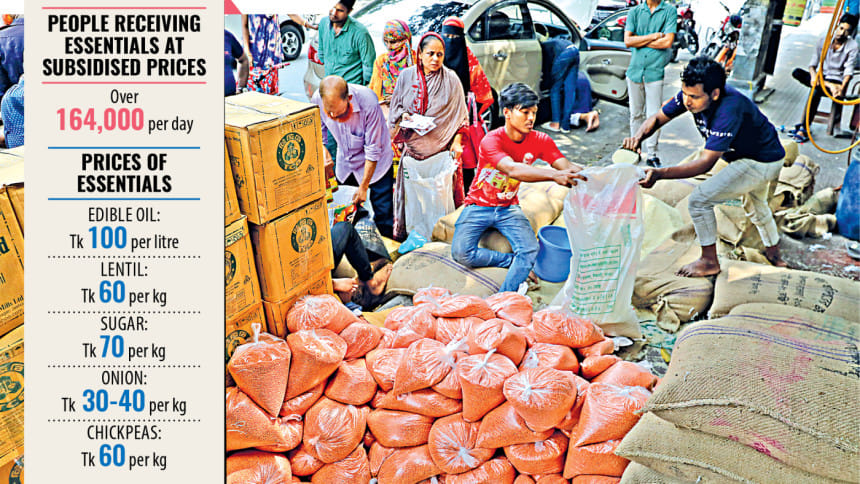TCB increases truck fleet amid calls for greater private sector role

The Trading Corporation of Bangladesh (TCB) has increased the number of trucks selling subsidised food across the country to 410 in March from 70 the previous month.
This move, according to the TCB, supported more low-income people, as the authorities are now advocating for greater involvement from the private sector.
At an event in Dhaka yesterday, the state-run corporation said that these subsidised essential goods provided much-needed relief to people amid near double-digit inflation and contributed to stabilising commodity prices.
In March, the TCB reported that each of its trucks carried enough supplies for 400 individuals daily, double the usual capacity of 200 in previous years.
During the discussion held at the Army Golf Club, the corporation under the Ministry of Commerce noted that its food assistance programmes, including family cards and open truck sales, reached nearly 41 lakh people in March.
At the programme, titled "Trade with TCB," Commerce Adviser Sk Bashir Uddin suggested that the TCB should engage the private sector in certain areas to increase efficiency and reduce costs.
Besides, Commerce Secretary (in-charge) Nazneen Kawshar Chowdhury also spoke of the potential for greater private sector engagement to unlock the TCB's full capabilities.
She highlighted areas such as strategic planning, quality control, and logistical innovation.
Established in 1972, a key focus of the TCB is to ensure the availability of essential commodities at affordable prices, especially for vulnerable populations. The corporation plays a vital role in stabilising market prices, lowering the cost of living, and contributing to national economic growth.
Referring to government expenditure on food procurement for the TCB, estimated at between Tk 12,000 crore and Tk 14,000 crore annually, Bashir Uddin said, "We want to see logical utilisation of these funds."
To do so, he said the TCB must concentrate on reducing leakages and trying to purchase more food grains with the allocated budget.
The adviser pointed out that during the previous political regime, several sectors had become criminalised, and the TCB was no exception.
He commented that improper practices had allowed many affluent individuals to obtain TCB family cards, which were meant for the poor and low-income people.
"There was a huge leakage in the selection of beneficiaries of the family cardholder," Uddin said in his address as the chief guest.
"I saw such people, who own a five-storey building, hold a family card. Jute mill owners also hold a family card, I saw it."
He also mentioned finding cases where individuals working in administration held three cards within one family. The adviser said the interim government was already scrutinising and reviewing it.
Uddin said that after discovering numerous family cards for subsidised food in the possession of affluent families, the authorities had blocked those cards.
Illustrating the criminalisation within the TCB's operations, he shared an example of a TCB dealer from the upscale Dhanmondi area who recently visited his office and mentioned being his neighbour.
"The living costs in this area are high. So how can a TCB dealer afford it?" he questioned.
Regarding recent price levels, the adviser suggested that the criminalised system built in the previous regime had been dismantled through the efforts of various government agencies.
He said that this ensured a competitive market, resulting in lower prices during Ramadan.
Commerce Secretary Nazneen Kawshar Chowdhury said that the TCB is not just a buyer or a distributor; rather, it is an enabler. "And its true potential can only be realised through strong and sustained engagement with the private sector."
"We are also exploring avenues to widen the basket of goods traded through the TCB and involve the private sector in strategic planning, quality control, and logistics innovation," she added.
Brigadier General Mohammad Foyshol Azad, chairman of the TCB, said that the corporation was "trying to open a new path for establishing business relationships with local and international traders."
"Businessmen will do business with the TCB to serve the nation, to support the people, and also to create opportunities for others," he said.
He agreed over the fact that the TCB faced certain challenges, including a "significant communication gap" with suppliers and that, being a government organisation, its contract and tendering processes sometimes took longer than usual.
"In some cases, we also failed to create alternative sources for a few specific commodities. Besides, the long supply chain coupled with the shortage of manpower at the TCB also creates hurdles in our routine activities," he said.
Md Abed Ali and SM Shaheen Parvez, both directors of the TCB, also spoke at the event.

 For all latest news, follow The Daily Star's Google News channel.
For all latest news, follow The Daily Star's Google News channel. 



Comments